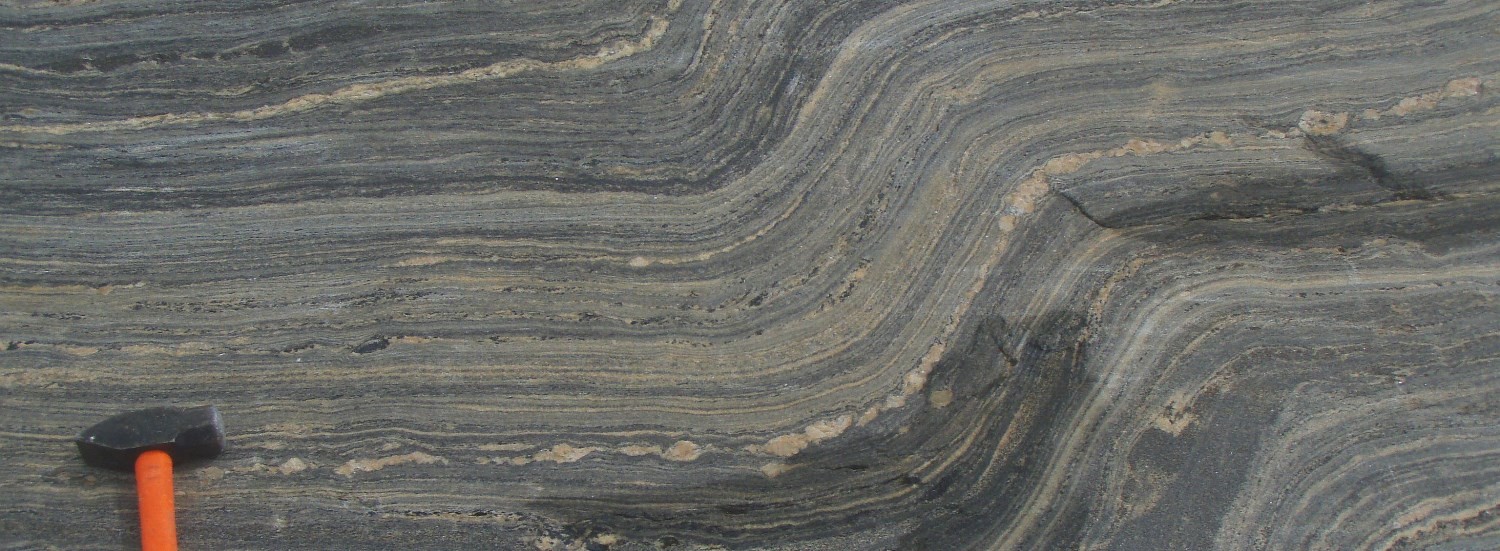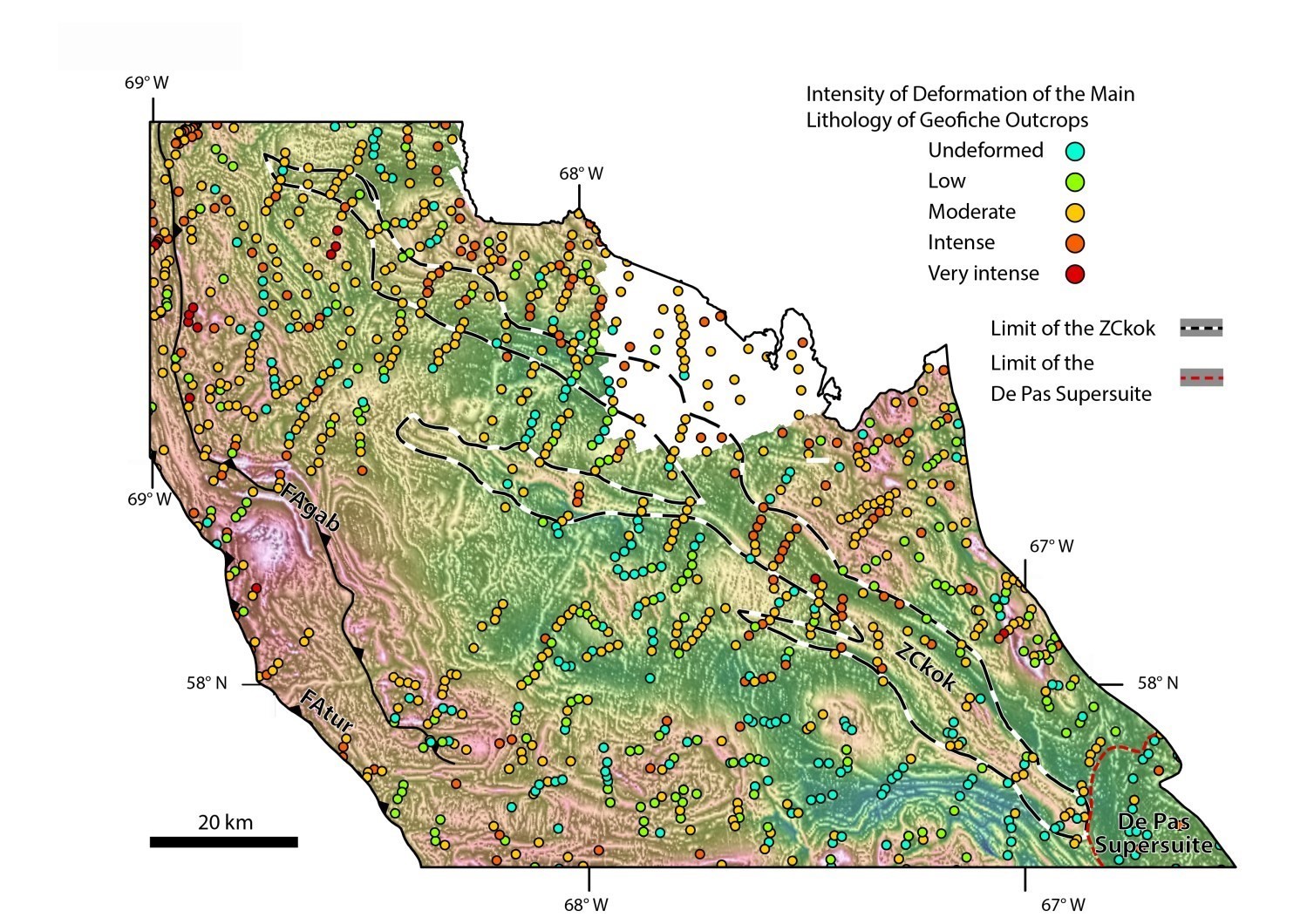| Author(s) | Lafrance et al., 2020 |
| Methodology | Defined from geological surveys and geophysical data |
| Geological(s) subdivision(s) | Churchill Province / Baleine Lithotectonic Domain |
| Main movement | Presumed dextral |
| Deformation style | Parallel |
| Metamorphic facies (mean facies related to main deformation) | Amphibolites |
Background and Methodology
The Koksoak Shear Zone (ZCkok) was introduced as part of the Southeastern Churchill Province synthesis. No regional shear zone had previously been identified in this area. However, aeromagnetic maps had prompted some authors to extend the Lac Tudor Shear Zone in a NNW direction to join the Lac Turcotte Fault (Wardle et al., 2002; Corrigan et al., 2018). This record is based on a compilation of structural measurements and on the interpretation of aeromagnetic maps (D’Amours and Intissar, 2012) of the northern part of the Baleine Lithotectonic Domain.
Boundaries and Morphology
| Width | 5 km |
| Length | 100 km |
| Orientation | NW-SE |
The ZCkok is oriented NW-SE. At its SE end, it is cut by the De Pas Supersuite, whereas its north end is poorly defined as its signature disappears in the Kaslac Complex.
Stratigraphic Units Concerned
Stratigraphic units affected by the ZCkok are the Qurlutuq and Ungava complexes, as well as the False Suite.
Structural Characteristics
❯ Main Fabrics
The compilation of structural measurements allows defining an average foliation plane oriented at 117°/85°. A certain variability of the data is observed, but in general, foliations are strong and have a dip >60°. A very limited number of mineral and stretch lineation measurements are available for this shear zone. Three measurements suggest that the dominant linear fabric is subhorizontal and oriented NW-SE.
| Main Fabric | Type of Fabric | Direction (°) | Dip / Plunge (°) | Number of Measurements | Comments |
| Foliation Sn | Tectonometamorphic and mylonitic foliation | 117 | 85 | 131 | |
| Lineation Ln | Mineral and stretch lineation | 3 |
Insufficient number of measurements to estimate the general orientation |
❯ Other Fabrics
Not observed.
❯ Folds
Does not apply.
❯ Crosscutting Relationships
Not observed.
❯ Kinematics
No observations were made in the field to determine the kinematics of this shear zone; however, assuming that this zone is an extension of the Rivière George Shear Zone (ZCrge), a dextral movement is interpreted.
Deformation Style
The intensity of deformation in the ZCkok varies from moderate to intense. Most outcrops display a regular planar fabric, such as foliation or gneissosity. The more deformed sites are affected by a mylonitic fabric. Although it is difficult to define a deformation style from geological compilation and aeromagnetic data, it appears that the deformation style of the ZCkok is parallel. Indeed, aeromagnetic lineaments associated with this structure are parallel to each other and projected fabrics have a constant orientation.
Metamorphic Characteristics
Rocks of the Baleine Lithotectonic Domain were affected by a partial melting event in the Archean and by amphibolite facies metamorphism in the Paleoproterozoic (Lafrance et al., 2020). Structures observed in the ZCkok area are probably Paleoproterozoic in age (Simard et al., 2013). The ZCkok is therefore believed to have developed at the amphibolite facies.
Alterations
Not observed.
Geophysical Characteristics
The aeromagnetic signature of the ZCkok is defined by a strip of continuous and parallel lineaments. Within this strip, rocks are generally more deformed than outside. The lineaments are cut by units of the De Pas Supersuite characterized by barely deformed rocks.
Chronological Markers
The ZCkok is cut by the De Pas Supersuite, which intruded between 1865 Ma and 1805 Ma. This structure is therefore probably contemporaneous with the ZCrge, whose minimum age of deformation is 1812 Ma (Vanier, 2019). Furthermore, by extrapolating the ZCkok to the SSE in the De Pas Supersuite, it approximately joins the ZCrge.
References
Publications Available Through Sigéom Examine
D’AMOURS, I., INTISSAR, R. 2012.Levé magnétique et spectrométrique aéroporté de la rivière Koksoak, Province de Churchill. MRNF. DP 2011-07, 8 pages and 180 plans.
LAFRANCE, I., VANIER, M.-A., CHARETTE, B., 2020. Domaine lithotectonique de Baleine, sud-est de la Province de Churchill, Nunavik, Québec, Canada : synthèse de la géologie. MERN. BG 2020-07, 2 plans.
SIMARD, M., LAFRANCE, I., HAMMOUCHE, H., LEGOUIX, C. 2013. Géologie de la région de Kuujjuaq et de la baie d’Ungava (SNRC 24J, 24K). MRN. RG 2013-04, 62 pages and 1 plan.
Other Publications
CORRIGAN, D., WODICKA, N., McFARLANE, C., LAFRANCE, I., VAN ROOYEN, D., BANDYAYERA, D., BILODEAU, C., 2018. Lithotectonic framework of the Core Zone, Southeastern Churchill Province. Geoscience; volume 45, pages 1-24. doi.org/10.12789/geocanj.2018.45.128
VANIER, M-A. 2019. Caractérisation des zones de cisaillement du sud-est de la Province de Churchill, Québec : un cas d’écoulement latéral en croûte-moyenne. Université Laval, Québec; Master’s thesis, 92 pages. hdl.handle.net/20.500.11794/37137
WARDLE, R.J., JAMES, D.T., SCOTT, D.J., HALL, J. 2002. The southeastern Churchill Province: synthesis of a Paleoproterozoic transpressional orogen. Canadian Journal of Earth Science; volume 39, pages 639–663. doi.org/10.1139/e02-004
Suggested Citation
Contributors
|
First publication |
Isabelle Lafrance, P. Geo., M.Sc. isabelle.lafrance@mern.gouv.qc.ca; Marc-Antoine Vanier, Jr. Eng., M.Sc. marc-antoine.vanier@mern.gouv.qc.ca, (redaction); Ghyslain Roy, P. Geo. (coordination); Claude Dion, Eng., M.Sc. (critical review); Simon Auclair, P. Geo., M.Sc. (editing); André Tremblay (HTML editing); Céline Dupuis, P. Geo., Ph.D. (english version) |



